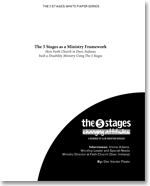Changing attitudes about differences
Category : Christian Views on Disability , Disability Attitudes , Inclusion
The email was to the point. “The student services department at Crown Point Christian is putting on a chapel on March 21. The theme is friendship and accepting those who are different.”
They wanted a speaker to help them spread the message. However, I would only have 10 minutes, and I knew a thorough presentation of The 5 Stages would be too much for that time. So I decided to do my fallback: talk about Ephesians 2:10.
This verse has proven to my failsafe way to Biblically ground attitudes toward people who have disabilities. Ephesians 2:10 says:
“For we are God’s handiwork, created in Christ Jesus to do good works, which God prepared in advance for us to do.”
Usually I tell people about four things I notice, and that one of the things I notice is not even there.
What are they?
Well, the three things I notice are:
- If we are God’s handwork, that means We were made on purpose.
- If we were made in Christ Jesus to do good works, then We were made for a purpose.
- And if those good works were prepared by God in advance for us to do, then Our purpose is not optional.
But then there’s one more thing that I notice that’s not there.
There is no asterisk. There’s no asterisk that exempts or absolves people with disabilities from the calling God has placed on their lives.
He has created each of us on purpose, for a purpose, and that purpose is not optional, whether we are disabled, poor, the same as others, different from others, rich, ethnically different, powerful, weak, old, young, sick, healthy, living in a poor mountain village in Peru, or living in Abu Dhabi.
I told the Crown Point middle schoolers that whether or not they were the same as others, or different from others, didn’t really matter. What mattered was how we treated others: like image-bearers of God each created to answer His call.
Crown Point Christian School, in Crown Point Indiana, is a ministry partner of Elim Christian Services, birthplace and inspiration for The 5 Stages.

